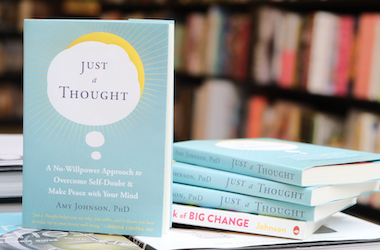Maybe take a few moments to recall how an argument usually starts?
Someone says or does something that you conclude is not right or appropriate. This can occur verbally or visually. When this happens our thoughts really pick up speed. “That’s not right or how can they believe this?”. Now we are caught up in it, the evidence is clear, and here we go again.
- What if we can start to understand that arguing with everyone might start from what we have learned from family, friends, schooling, etc?
As children we are praised for being in agreement with what we were told was true or correct behavior. Whenever we weren’t in agreement with these ideas we were told we were wrong.
Don’t like how something went? We can argue about how it should have been different. I am right and you are wrong. “We have learned there is certain value in being right”.
With these ideas, it becomes difficult to stop being argumentative with everyone.
- What if we can be open to the idea, that there can be many different ways to look at the very same thing. Consider a camera lens. It can be adjusted or changed to see a very narrow path or a much wider version of identical scenes. The lens is limited to its capabilities. We humans can just be in a certain spot of focus, like a lens. This makes it hard to see what else is possible. Simply be aware that there can be multiple ways to look at things.
- I’m not suggesting you have to be wrong or the other person is right. Just an awareness that our lives playing out are not always black or white versions they seem.
- What if the act of being argumentative is about something totally different?
- Lots of old, past thoughts come rushing in which have nothing to do with the present moment and we’re off to the races reliving those past experiences and tying them to right now.
- Our minds are great at taking the past and making it the present (wow-wow).
- Giving people the opportunity to express themselves and convey their views and ideas. This is a great step forward to stop being argumentative with everyone.
How to Be Less Argumentative
Let’s begin with a simple understanding that our mind and physical body are designed to help us survive.
When anything shows up that is perceived as a possible threat, our body and mind jumps into action. Minds call for adrenaline and cortisol for a flight or fight response, then our bodies do what they are told. We have anxious feelings that show us we are in protection mode. This can certainly happen when we find ourselves in an argument.

We can be less argumentative by slowing down our thinking when we feel our angry energy ramp up:
- Take a few deep breaths
- Notice your surroundings
- Really look at the other person
- Try to just listen, without wanting to have your version heard
- Consider if what you are arguing about is that big of an issue (really!)
- Take an agreed upon break, be sure to keep this agreement as scheduled, a timer can be a great tool. Don’t have another argument by forgetting to come back? (yikes)
- Find something to laugh at, Humor can easily interrupt angry thoughts. My wife likes to remind me we aren’t in court trying to show a jury my side! (ha-ha)
- Take a walk (just don’t get lost and forget to return)
- Anything else that would slow your thinking and the situation down.
The biggest thing is a heartfelt apology. This goes a long way.
How to Not Get Defensive
Being defensive is the act of protecting yourself, someone else, or something else from a sense of danger.
It is a reaction often caused by fear and insecurity (being bullied leads to feeling insecure).
Defensive behavior can show up in different ways:
- A complete shutdown of our nervous system, as an animal plays dead to avoid danger.
- A ramping up of the nervous system into our flight or fight mechanism.
- Being defensive plays out in all of us at times, but being overly defensive can sometimes go beyond what would be considered a reasonable response.
- Again, when we experience acting defensive, it really can be just a learned response stemming from past arguments.
- I believe our learned responses play a huge part of our defensiveness.
We most likely learned early in life to:
- Stand up for yourself.
- Don’t be weak.
- You have to protect a sibling, relative, friends, etc.
- Only the strong get ahead in life.
From this and more, we probably learned that we needed to defend everything that is contradicting from what we have learned, been taught, shown and certainly believed.
- Just having an awareness of this learned behavior, can go a long way to easing defensive feelings when they start to show up.
- What if you can see the light bulb turn on that this process is in play. You can’t stop our thoughts, but you can be more aware of this (an aha moment), which can lead to slowing your responses down. Argumentativeness and Defensiveness play well off of each other. It is in this “response awareness” that we can learn how to stop being argumentative and defensive so often. It is possible to change our rapid fire, automatic need to respond at that very moment.
- What if whatever we are experiencing, we often can take a moment to determine if any of this is really about just “Me” personally?? Life’s experience becomes personal attacks when our thoughts label them as personal. “Without fail it works this way.”
Remember water running off a duck’s back? The rain might bother you, but not the duck, the duck doesn’t have a label for rain, it’s just rain.
- Again take a few slow breaths.
- Move to a different location.
- Ask the other person(s) for the opportunity to take a little time to respond?
- Ask the other person(s) for a little time to check in with yourself about what is actually being said, before responding.
We can all learn how to not get defensive.
How to Be Less Judgmental
Judgments can be where lots of arguments start and or end up!
Our judgements of the other person and or of what is being presented.
For example:
How could they be saying that? Do they not know better? It seems crazy to say this? Don’t they care about ****? This usually can start as internal talk but can easily make its way into the conversation .
What if we learned as children to compare and judge people and events against each other. I’m smarter or faster than someone. Then we carry all of our learned ideas and beliefs into the present moment.
Being judgmental ends up that someone or something is right or wrong, better than, good or bad, etc!
- How we can be less judgmental is by starting with ourselves.
- Maybe don’t always assume what you are experiencing and feeling is the whole truth.
- Asking yourself if your reactions seem reasonable, given the situation?
We can all learn how to be less judgmental.
Life is designed to be loving, happy and not fearful. We can not change anyone other than ourselves.
What if we can come to understand that there are about 8 billions different ways to perceive (view) the very same words or events?
Think about how one person loves a book or movie and how another person doesn’t like it?
Shapes in the clouds, one person sees it and another doesn’t?
What if we could become more aware of how our thoughts are creating our perceptions of life? We could then realize that differences don’t need labeling so right or wrong, good or bad, etc.
We have a choice, every minute, to not take life’s events as a personal attack, but instead simply life is playing out.
When we understand the possibilities of this, our lives can be different!
Freedom from Argumentativeness with Dr. Amy Johnson
Amy Johnson is a psychologist and Change Coach who helps people find freedom from anxiety, habits, insecurity and low self-esteem. She has written several books and leads live courses and group coaching.
Amy Johnson helps find freedom from relationships issues through insight and wisdom, not willpower.
One of Amy Johnson’s most popular books is The Little Book of Big Change, about the principles behind the human experience. The Little Book of Big Change shares a unique approach to healing anxiety, worry and insecurity. The Little Book of Big Change will help you understand what is at the root of your anxiety, low self-esteem, and self-destructive habits.
About the Author

RJ Colovich is a certified Change Coach.
You can see more about RJ and his coaching services here.






